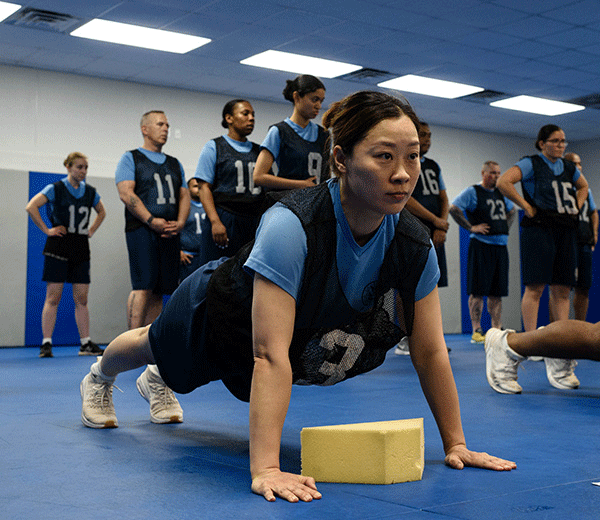Supporting mental and physical health: an overview of CBP resources and services
3 March 2023
By Andrea Bright, Assistant Commissioner, United States Customs and Border ProtectionWith approximately 64,000 employees, U.S. Customs and Border Protection (CBP) is the largest law enforcement organization in the United States and one of the largest in the world. Eighty per cent of the workforce are geographically dispersed agents and officers who face unique pressures, stressors, and emotional demands during their duties.
On any given day, CBP’s operators face a host of environmental challenges, long work schedules, remote locations, extreme weather, and exposure to a variety of ailments such as scabies, tuberculosis, rashes, and skin and respiratory infections. These conditions take a toll on employees’ mental and physical health. To address the unique needs of the workforce and ensure they can perform optimally, CBP takes a holistic approach. From employee workplace safety to a variety of physical and mental health programmes, CBP provides resources early and often, and continuously reassesses the requirements.
Providing employee resources early and often
CBP considers the full employee life cycle and the demographics of the workforce to provide meaningful resources and services. Providing resources early at the onset of an employee’s career is pivotal to their success in their current and future positions.
For example, CBP officers entering the training academy are immediately exposed to well-being practices. As employees advance in their career and become leaders, CBP builds upon this initial mindfulness training. This has been a recent change for CBP, but a critical one. Starting the conversation of mental well-being early in an employee’s career is a significant tool in their coping toolbox.
Outside of incorporating mental well-being into mandatory training, CBP also regularly communicates the different work-life services and benefits available to the workforce. CBP has a robust and unique menu of services provided to employees that sets them apart from similar organizations within the United States. This includes the following services:
- CBP Family Care Programs support employees in their caregiving roles. The Childcare Subsidy Program offsets childcare costs, and the Backup Care Program helps with temporary, short-term care when an employee’s existing child, adult, elder, or even pet care is unavailable.
- CBP’s Employee Assistance Program (EAP) is uniquely designed to locate providers for health and wellness coaching, financial wellness planning and support, and legal support services. This programme is an on-call, short-term support programme offering employees the opportunity to immediately call and engage in a confidential counselling session.
- CBP’s Peer Support and Chaplaincy Programs are comprised of trained officers and professional staff. This cadre of employees are trained to provide confidential, peer-level support to CBP’s workforce and their families, and are acutely aware of the work environment and local environment employees are operating in.
- On-site clinicians are trained professionals who employees see around the workplace. They provide immediate support if there is an incident at the workplace and are trained to spot concerning behaviours. Employees are familiar with these individuals, having interacted with them within the workplace, and are given assurance that the clinician is a professional.
- The Veteran Support Program provides special support for former military employees who have their own unique stressors. Veterans represent nearly 30% of CBP’s workforce, and therefore it is important for them to be set up for success. The programme helps them navigate a complicated web of resources provided to them through various agencies, and connects them with each other.
- CBP’s Employee Health Benefits Program includes access to long-term mental health care providers. Through the U.S. Federal Employee Health Benefits Program, CBP employees can choose a provider that meets their needs.
- Physical Health Programs encourage employee physical fitness from the beginning of CBP employment. All CBP operators must pass a medical and physical fitness examination prior to their final job offer and then again during their academy training. CBP takes this a step further by allowing all employees three hours of on-duty physical fitness activities each week. Additionally, CBP hosts fitness challenges throughout the year, and many of the larger CBP locations have on-site fitness classes and equipment for employee convenience.
- Workplace safety is a major component of caring for the physical and mental health of the workforce. CBP has safety experts located across the U.S. to support and aid employees with workplace safety. These safety experts work alongside CBP’s operators to assess working conditions and determine what is needed to operate in a safe work environment.

Communication is key
The value of communicating workforce services and resources cannot be overestimated. For employees to use the proper tools to cope and thrive, they must know about them.
The majority of the CBP workforce is working the line, patrolling, and conducting operations – they are not behind a computer. To reach CBP’s operators, CBP is creative in using multiple channels of communication to reach not only employees, but also their family members. These include traditional communication methods of email, staff meetings, and musters, but CBP intentionally extends beyond these modes of communication. By using public websites, mobile applications, social media, paper mail, electronic opt-in newsletters, and robotic automation, CBP is reaching employees in a more accessible way, and inviting family members to follow along.
Meeting employees where they are
Another critical component of stress management, mental and physical health is meeting employees where they are in their professional journey and acknowledging their value and needs. For CBP, this includes a national awards programme and the recognition of those employees lost in the line of duty. These robust programmes demonstrate CBP’s deep commitment to the workforce and to their families.
As part of this, beginning in 2023, CBP is reinvigorating its outreach events. CBP’s outreach events bring leadership along with resources and services directly to field locations across the U.S., culminating in a picnic-style event. Employees and their families are invited to participate in child-friendly activities while obtaining information on every programme and resource offered, including retirement, healthcare, financial wellness, parenting and workplace safety, among others.

Assess, adjust, repeat
Continually assessing the pulse point of the workforce, and staying in touch with what staff need and with the ever-changing work environment is key. To ensure CBP is in fact meeting employees where they are on their journey, several tools are used. In addition to using a U.S. government-wide tool, the Federal Employee Viewpoint Survey, CBP also recently initiated an Occupational Health Assessment. Unlike the government-wide survey, the Occupational Health Assessment is customized to the CBP workforce and aims to provide a more accurate measurement of CBP’s employees’ perceptions of their job demands and job resources, while providing insight into the areas impacting employee motivation and workplace stress.
CBP is also continuously leveraging and enhancing its data analytic capabilities, beyond simply counting how much a program is used, to find meaningful trends and determine the impact of its workforce programmes. Similarly, CBP regularly explores new and novel technology to support workforce needs, from heat stress detection to reducing anxiety.
There is no greater asset to any organization than its people – they are its heart and soul. Keeping the workforce physically, mentally, and emotionally healthy is essential to the success of CBP’s mission.
More information
cbpwco@cbp.dhs.gov
